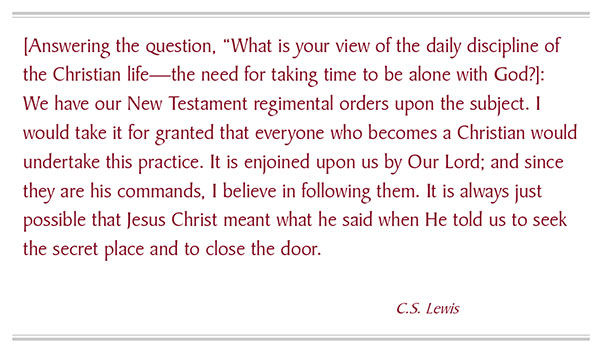Back to series


Recommended Reading:

Download or Listen to Audio
Growing in Prayer Part 1: Hinderance to Prayer
(This is one part of a two-part series on Growing in Prayer Part 1, Part 2)
Click here to open a Print - Friendly PDF
We hear it all the time, don’t we? If you are really serious about your faith, if you want to be more than merely a nominal Christian, a really spiritual person, then you must be a man or woman of prayer. Warren Wiersbe, author and speaker, put it this way: “No Christian rises any higher than his or her prayer life.” And, “The hidden life of prayer is the secret of an open life of victory.”
“This is the testimony of saints through the ages,” wrote William Carey, the missionary pioneer. “Prayer—secret, fervent, believing prayer—lies at the root of all personal godliness.”
Nineteenth-century pastor E.M. Bounds, who wrote extensively on the subject, noted,
God’s acquaintance is not made hurriedly. He does not bestow His gifts on the casual or hasty com-er and go-er. No man can do a great and enduring work for God who is not a man of prayer, and no man can be a man of prayer who does not give much time to praying.
Yes, prayer is important; it is essential.1 Considering this, Paul exhorts us to “pray continually” (1 Thess. 5:17 NIV). But I confess, as a pastor, I don’t. Prayer is a subject that haunts me; it convicts me; it draws forth feelings of regret, guilt, even grief. For I know about myself (as you know about yourselves) that I do not pray as I ought. I would be ashamed for the world to know how little I pray. But here I am writing on the theme “How to grow in prayer.” So as I write these words, I say, “Lord, teach me to pray.” How can I more fully enter into this world that all too often I glimpse only from afar? I know that I’ve only waded in the shallows of a vast ocean that lies before me—an ocean than others have experienced far more deeply than I.
I write aspirationally, as when we sing hymns that speak of Christian experience far beyond us. A life of prayer is something to which we are all called and to which we should all aspire. What would it mean for me to “devote myself to prayer,” to “pray continually”? How can we grow in prayer?
Why Is Prayer So Hard?
I begin this two-part journey by addressing the first question that came to my mind: why is prayer so hard? I don’t want to offer any excuses; we have no excuse for not doing anything that God calls us to do. But understanding hindrances to prayer does help us to see what we’re up against when we face the challenge of becoming the people of prayer God wants us to be. I’ll use the three standard categories of Scripture as a guide: prayer is hard because of the world, the flesh, and the devil.
The World That Shapes Us
First, think about the effect of the world around us—this contemporary culture in which we live. I doubt if there has ever been a time that has been so antithetical to a life of prayer. We live in a world that bombards us with its constant distractions. You can’t get away from it. Ours is a world of constant noise and chatter, wherever you go—from the radio in the car, to the TV at home, to the Muzak at the mall. It’s all around us. Where can you find those precious moments of silence and solitude where you can gather your thoughts and focus on the Lord?
 We now carry our computers with us in our pockets. Our smart phones connect us to the whole world 24/7. Technological progress flows toward increasing complexity, and it always results in more and more of everything faster and faster. As Max Lucado observed, America is the only country in the world with a mountain named Rushmore. I think of Dallas Willard’s challenging response when people asked him how to grow spiritually: “You must ruthlessly eliminate hurry from your life, for hurry is the great enemy of spiritual life in our world today.” Or, in the words of English preacher Samuel Chadwick (1860–1932), “Hurry is the death of prayer.”
We now carry our computers with us in our pockets. Our smart phones connect us to the whole world 24/7. Technological progress flows toward increasing complexity, and it always results in more and more of everything faster and faster. As Max Lucado observed, America is the only country in the world with a mountain named Rushmore. I think of Dallas Willard’s challenging response when people asked him how to grow spiritually: “You must ruthlessly eliminate hurry from your life, for hurry is the great enemy of spiritual life in our world today.” Or, in the words of English preacher Samuel Chadwick (1860–1932), “Hurry is the death of prayer.”
In such a fast-paced world, who has time to pray? I like C.S. Lewis’s observation:
The very moment you wake up each morning . . . [a]ll your wishes and hopes for the day rush at you like wild animals. And the first job each morning consists simply in shoving them all back; in listening to that other voice, taking that other point of view, letting that other larger, stronger, quieter life come flowing in.2
That’s not easy. The world we live in distracts us. And the world we live in seduces us. The world dazzles us with its goodies. Like Christian at Vanity Fair in The Pilgrim’s Progress, we are lured off the road to the Celestial City to spend a while in the pleasures of this life.
Who thinks of the eternal anymore? Who cares about sin and righteousness, heaven and hell? This world is full of enticements and entertainments of every sort—those subtle seductions that pull us away from focusing on God and His kingdom and His glory.
We are bombarded with messages that brainwash us into thinking that prayer is a waste of time. Let’s be practical—get busy—do something. Don’t get on your knees. That’s why the life of prayer is inherently countercultural. To pray faithfully, you must be willing to swim against the cultural stream. Paul says, “Don’t let the world around you squeeze you into its own mold, but be transformed by the renewing of your mind” (Rom. 12:2 Phillips and NIV). Or Peter says, recognize that this world is only temporary—it will not last. “The end of all things is near,” he says. “Therefore be self-controlled and sober-minded for the sake of your prayers” (1 Pet. 4:7 ESV).
And this is a fallen world, a sinful world. As a result, this world not only distracts us and seduces us, but it also wounds us. Abused children have a difficult time trusting anyone; jilted lovers are reticent to open their hearts again. In this world, dangers abound—bad things happen and God doesn’t seem to care.
Maybe you prayed as a child that your parents would quit fighting, and they didn’t. I remember growing up, praying that the Vietnam War would end. It didn’t, at least, not in my time frame. Prayer didn’t work for me in that regard. Life is hard. We learn to protect ourselves, and we retreat into our shells like little hermit crabs, insulating ourselves from the threats that surround us—insulating ourselves even from God Himself.
Or maybe we develop another form of compensation; we become driven to achieve, to be somebody, to prove ourselves to the world. We become consumed by a restless ambition that makes us addicted to activity. We dare not stop for a moment to spend time in God’s presence, to rest in His love. That’s what the world does to us: it distracts us, it seduces us, and it wounds us. No wonder prayer is hard.
The Flesh We Indulge
If the world distracts us, then I would say the flesh deludes us. Our lustful cravings for the physical pleasures and comforts consume us. We face the battle of simple laziness. Prayer takes self-discipline; it takes diligence. Unlike eating and sleeping and watching TV, it does not come naturally to us. It is demanding. The spirit is willing at times, but the flesh is weak. And we too often indulge the flesh at the expense of the spirit. So we continue to splash around in the shallowness of the spiritual baby pool instead of swimming in the spiritual depths—an experience made possible only by the discipline of prayer.
But “the flesh” is more than just our bodily appetites. The flesh as Paul uses the term refers to our whole fallen humanity. It speaks of a life-orientation that is cut off from God and that, in fact, opposes Him. The flesh is our self-centered, self-exalting self-pride that deludes us into thinking that we are self-created and self-sufficient.
Who needs God? As Oprah preaches, “You can do it.”3 Prayer, why, that’s a last resort, maybe. It’s the back-up parachute, an emergency measure when all else fails. In effect, we think, prayer is for weaklings; it’s for failures; it’s for those not strong enough to stand up courageously to the challenges of life. “I can do it. So who needs God?” We don’t say that exactly—not if we are churchgoers in good standing, but that is how we live—”in the flesh”—trusting in our own strength and our own power, bolstered by our own self-sufficient pride.
I say we are deluded, because, in fact, we are not self-created, and we are not self-sufficient. We think we hold our destinies in our own hands, that we are the masters of our fates, the captains of our souls. But it’s a lie! We don’t know what a day will bring.
Not long ago, a very close pastoral friend of mine was encouraged by his wife to get a checkup, and they discovered a tumor in his brain. His life was turned upside down in an instant. I asked, “Jim, we preach about this sort of thing all the time. How does it feel to experience it?” I am glad to say he is facing this with great courage and faith. But we just never know—so much of life really is outside our control. The very act of praying recognizes that. It says, I can’t do it; I don’t control my fate.
In that sense, prayer is an act of personal humiliation. When we pray, we acknowledge our weakness, our lowliness. We acknowledge that we have needs that we cannot meet ourselves. Abraham Lincoln famously said, “I have been driven many times to my knees by the overwhelming conviction that I had nowhere else to go. My own wisdom, and that of all about me seemed insufficient for the day.”
That’s what it takes—a humility that recognizes our need. And our flesh rebels against such a confession. But listen to what Jesus says:
I am the vine; you are the branches. If you remain in me and I in you, you will bear much fruit; apart from me you can do nothing. If you do not remain in me, you are like a branch that is thrown away and withers; such branches are picked up, thrown into the fire and burned. If you remain in me and my words remain in you, ask whatever you wish, and it will be done for you. This is to my Father’s glory, that you bear much fruit, showing yourselves to be my disciples. (John 15:5–8 NIV)
The Devil Who Deceives
The world distracts; the flesh deludes; and the devil, he deceives. I like the quote again from Samuel Chadwick: “The one concern of the devil is to keep the saints from praying. He fears nothing from prayer less studies or work or Christian activities. He laughs at our toil, mocks our wisdom, but trembles when we pray.
So we should not be surprised, then, that one of the devil’s chief aims is to hinder our prayers. He does this in all sorts of ways, all related to his primary weapon of deception, since, as Jesus tells us, he is a liar from the beginning, and when he speaks lies, he is speaking his native language. He deceives us, and two forms of deception stick out in my mind.
First, he deceives us by accusing us. That’s what the name satan in Hebrew and diabolos in Greek means—one who opposes or accuses. And he hinders our prayers through his whispering in our ears, “Who do you think you are praying to God? Ha! You hypocrite! Why should God listen to you—the way you’ve lived?”
You know that you have done what you ought not to have done, and that you have not done what you ought to have done, and there is no health in you. The devil is right—you’ve failed as a follower of Jesus Christ. You have denied Him by your life, if not by your lips. You don’t deserve the name Christian.
Yes, the devil’s accusations hit the mark, and when you listen to that voice you are filled with guilt. You know you’re just a spiritual derelict, and you despair of ever being that man or woman of God you once aspired to be. Why bother, it will never happen. So you don’t pray. And the devil wins.
But though some of what the devil says is true, it’s not all true; more important, it’s not the whole truth. You see, he deceives us when he accuses us, because in the process he confuses us. Yes, we are sinners; yes, we have failed to be and do what God has called us to; yes, we don’t deserve to be heard when we come before the righteous and holy King of heaven and earth. But the devil knows nothing of God’s grace. For in the end, it’s not our sin that keeps us from God, it’s our pride.
You see, the gospel tells us that we’ve all sinned before God—every one of us. We’re all guilty before Him—far more guilty than we realize. God knows our sin, even more than the devil does, but in His grace He has overcome our sin by taking that sin upon Himself through the death of His Son Jesus Christ. It is as we acknowledge our sin before God and call upon Him to rescue us in His grace and put our faith in Jesus as our Savior—when we say, “God, have mercy on me, a sinner”—that’s when the gates of heaven are opened, and we are given free access into the heavenly throne room.
Grace comes through truth. That’s the truth that the devil doesn’t want you to know. But the devil continues to confuse us—he continues to fill our minds with false ideas about God. That’s been his modus operandi since those first days in the garden.
The Challenge of Faith
And this leads to what I consider our final and greatest hindrance to a real life of prayer: We don’t pray because we don’t really believe what we say we believe. It is what Jesus called quite simply “little faith.” “O you of little faith,” He said to His disciples—and He says the same to us.
When we don’t pray, we have to ask ourselves if we really believe that God is great and God is good. The devil has confused us, as he confused Eve in the garden, with the idea that the Lord doesn’t have our best interests in mind—He can’t be trusted with our welfare. Maybe we really do know better than He does what is best for us after all. So why should we pray?
 But after the revelation of the love of God on the cross of Christ, how can we possibly believe that? Paul put it like this: “He who did not spare his own Son, but gave him up for us all -- how will he not also, along with him, graciously give us all things?” (Rom. 8:32 NIV). He gave us His own Son. Do you think He will withhold from you anything—anything at all—which is for your eternal and ultimate good? It’s ludicrous! Then why don’t we pray to this good and gracious God? “Which of you, if your son asks for bread, will give him a stone?” Jesus asks. ”Or if he asks for a fish, will give him a snake? If you, then, though you are evil, know how to give good gifts to your children, how much more will your Father in heaven give good gifts to those who ask him!” (Matt. 7:9–11 NIV).
But after the revelation of the love of God on the cross of Christ, how can we possibly believe that? Paul put it like this: “He who did not spare his own Son, but gave him up for us all -- how will he not also, along with him, graciously give us all things?” (Rom. 8:32 NIV). He gave us His own Son. Do you think He will withhold from you anything—anything at all—which is for your eternal and ultimate good? It’s ludicrous! Then why don’t we pray to this good and gracious God? “Which of you, if your son asks for bread, will give him a stone?” Jesus asks. ”Or if he asks for a fish, will give him a snake? If you, then, though you are evil, know how to give good gifts to your children, how much more will your Father in heaven give good gifts to those who ask him!” (Matt. 7:9–11 NIV).
Prayer Is a Relationship of Love
Do we think of God as our Father in heaven? Maybe we don’t pray because we don’t really think that God is, in fact, personal in that way. Too often, we think of Him as some great life force that somehow governs the cosmos—a benign energy field that keeps things running according to some mysterious plan. Maybe we don’t pray because we don’t really believe that in Christ this great and good God is in truth our loving heavenly Father.
You see, prayer is not a transaction. It is not a form of magical manipulation by which we say certain words in a certain way as a kind of incantation, and—bingo!—we get what we want. Prayer, in the Bible, is essentially about a relationship—a relationship with God who created us in His image. God is a person, and He created us in His image as persons.

And He is a speaking God. “In the past God spoke to our ancestors through the prophets at many times and in various ways, but in these last days he has spoken to us by his Son” (Heb. 1:1–2 NIV). The Person of God has taken humanity into Himself. The eternal Word of God has become flesh in Jesus Christ. God has given us His testimony to that incarnate Word in the written Word, the Scriptures. And by the Spirit, our God continues to speak to us through that Word, and in prayer He invites us to speak to Him and to relate to Him. The true I in relationship with the true God, that’s what true prayer is. It’s a relationship—a communion of love. “True, whole prayer,” wrote Augustine, “is nothing but love.”
And that, you see, is what leads us directly to Jesus. So we ask Him, “Lord, teach us to pray.” And in part 2 of this article, we will consider Jesus’ response to that simple request.
|
Notes: |
|||

William L. Kynes
Pastor, Senior Fellow for Pastoral Theology, CSLIWilliam L. "Bill" Kynes is the Senior Fellow for Pastoral Theology at the C.S. Lewis Institute, and retired Senior Pastor of Cornerstone, an Evangelical Free Church, in Annandale, VA, where he served from 1986 - 2022. He majored in Philosophy at the University of Florida, where he also played quarterback and was later inducted into the university’s Athletic Hall of Fame. He attended Oxford University as a Rhodes Scholar, receiving an MA in theology. He received an MDiv from Trinity Evangelical Divinity School, before returning to England for a PhD in New Testament from Cambridge University.

Recommended Reading:
Kevin DeYoung, Crazy Busy: A (Mercifully) Short Book about a (Really) Big Problem (Crossway, 2013)
“I’M TOO BUSY!” We’ve all heard it. We’ve all said it. All too often, busyness gets the best of us.
Just one look at our jam-packed schedules tells us how hard it can be to strike a well-reasoned balance between doing nothing and doing it all.
That’s why award-winning author and pastor Kevin DeYoung addresses the busyness problem head on in his book, Crazy Busy — and not with the typical arsenal of time management tips, but rather with the biblical tools we need to get to the source of the issue and pull the problem out by the roots.
Highly practical and super short, Crazy Busy will help you put an end to “busyness as usual.”
 COPYRIGHT: This publication is published by C.S. Lewis Institute; 8001 Braddock Road, Suite 301; Springfield, VA 22151. Portions of the publication may be reproduced for noncommercial, local church or ministry use without prior permission. Electronic copies of the PDF files may be duplicated and transmitted via e-mail for personal and church use. Articles may not be modified without prior written permission of the Institute. For questions, contact the Institute: 703.914.5602 or email us.
COPYRIGHT: This publication is published by C.S. Lewis Institute; 8001 Braddock Road, Suite 301; Springfield, VA 22151. Portions of the publication may be reproduced for noncommercial, local church or ministry use without prior permission. Electronic copies of the PDF files may be duplicated and transmitted via e-mail for personal and church use. Articles may not be modified without prior written permission of the Institute. For questions, contact the Institute: 703.914.5602 or email us.
-
Recent Podcasts
From Anti-Christian to Pastor – Brian Smith’s Story
by Jana Harmon, Brian Smith on January 17, 2025Brian grew up in a small Georgia town...Read More
-
Time With God
by Aimee Riegert, J.I. Packer on January 10, 2025
-
Faith and Reason – Henare Whaanga’s Story
by Henare Whaanga, Jana Harmon on January 3, 2025
-
Recent Publications
Why Are Christians So Hypocritical?
by William L. Kynes on January 1, 2025Oh, the hypocrisy of those Christians—they talk so...Read More
-
How Artists and Their Art Can Point Us to the Creator
by Russ Ramsey on December 2, 2024
-
What about Jesus’s Childhood?
by Jim Phillips on December 1, 2024
0
All Booked
0.00
All Booked
0.00
All Booked
23931
GLOBAL EVENT: Sentenced to Death with Maryam Rostampour-Keller, 8:00PM ET
https://www.cslewisinstitute.org/?event=global-event-sentenced-to-death-with-maryam-rostampour-keller-800pm-et&event_date=2025-02-07®=1
https://www.paypal.com/cgi-bin/webscr
2025-02-07

Next coming event
Days
Hours
Minutes
Seconds
GLOBAL EVENT: Sentenced to Death with Maryam Rostampour-Keller, 8:00PM ET
On February 7, 2025 at 8:00 pmSpeakers

William L. Kynes
Pastor, Senior Fellow for Pastoral Theology, CSLI
Team Members

William L. Kynes
Pastor, Senior Fellow for Pastoral Theology, CSLIWilliam L. "Bill" Kynes is the Senior Fellow for Pastoral Theology at the C.S. Lewis Institute, and retired Senior Pastor of Cornerstone, an Evangelical Free Church, in Annandale, VA, where he served from 1986 - 2022. He majored in Philosophy at the University of Florida, where he also played quarterback and was later inducted into the university’s Athletic Hall of Fame. He attended Oxford University as a Rhodes Scholar, receiving an MA in theology. He received an MDiv from Trinity Evangelical Divinity School, before returning to England for a PhD in New Testament from Cambridge University.






